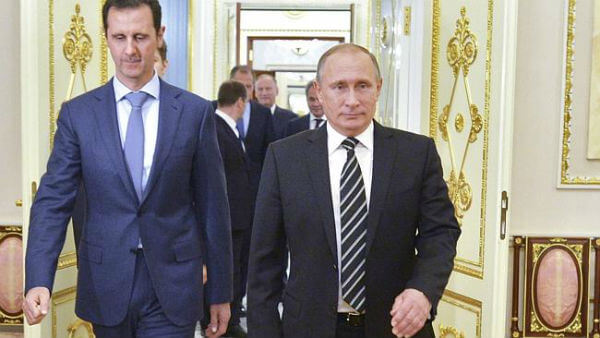
Following the suspension of UN-led peace talks, Lina Sinjab reports: Teams of diplomats representing countries supporting the opposition are pushing behind the scenes in Geneva for concessions from all parties involved in the war.
But almost everyone, whether diplomats or the opposition, says it is the US which is key to success – by using its leverage on Russia.
Russia is the only world power involved in the Syrian conflict with a military base in the country – therefore it could bring exert significant pressure on the regime of Bashar al-Assad to stop the violence.
But there is a limit to what the US is prepared to do.
A senior US Department of State official told me: “We are not ready to go to World War Three to solve this.”
The US, however, is spending billions of dollars in the battle against the self-proclaimed Islamic State (IS), which controls large parts of Syria.
Many Syrians feel the selective involvement of the US is hypocritical.
The US official was adamant that Secretary of State John Kerry wants to end the violence, and is determined to succeed.
But everyone here thinks the opposite. Almost at every corner, you hear the same thought: The US has handed over Syria to the Russians for free. [Continue reading…]


A senior US Department of State official told me: “We are not ready to go to World War Three to solve this.”
I’m glad to hear it. Too bad more people don’t feel this way.
The article isn’t clear about what “everyone in Geneva” thinks we should do to increase the cost to Russia. More sanctions? Blockade the country? Implement Clinton’s no-fly-zone? Just how close to a nuclear exchange are the hawks willing to go to win this humanitarian war?
If a decade from now historians have come to a consensus on when World War Three began, they may well decide on 2013: the year in which dictatorial power bloomed.
Sisi took power in Egypt and the Rabaa massacre followed, and Assad carried out the deadliest chemical weapons attacks in the world in decades, provoking a merely theatrical display of outrage from the U.S.
That was when it became clear that Obama was content to maintain his role as a disinterested spectator.
Still, for those with a myopic fixation on American power, the assumption prevails that a world in which the U.S. exercises less power is somehow more peaceful.
I guess if ones only concern is the preservation of American lives, the situation in Syria, its impact across the Middle East and Europe, can only be mildly perturbing because in spite of the carnage there, life in the U.S. is barely affected. And for those worried about those dangerous refugees being let into the country, the State Department continues to offer reassuring messages about the barriers of entry being higher than ever.
The problem, as I see it, is that Bush/Cheney fueled such a visceral aversion to American power that most opponents of the war in Iraq are inclined to believe that America’s influence in the world is exclusively negative.
But to assess whether American influence can be exercised in positive ways, you don’t have to believe in the U.S. having special virtues — you merely have to look at how power is exercised and by who, as American power is perceived as diminishing.
During Obama’s presidency, look at the men whose influence across the Middle East has grown as each has sought ways to demonstrate their own strength: Bashar al-Assad, Qasem Soleimani, Vladimir Putin, Abu Bakr al-Baghdadi, Recep Tayyip Erdoğan, Mohammad bin Salman Al Saud, Abdel Fattah el-Sisi, and Benjamin Netanyahu.
U.S. officials can posture as peaceniks, but they do so merely to parry difficult questions — not to diminish wider conflict.
It’s ironic that Obama officials are now employing this emotive line of reasoning — we either stick to our current course or the alternative is World War Three. Netanyahu used to make a very similar extreme argument when asserting that Iran’s nuclear program would have to be completely dismantled or Israel would end up being annihilated. Both employ manipulative hysteria.
And who can yield the greatest advantage right now in ramping up fears of a nuclear exchange? Putin.
It’s ironic that Obama officials are now employing this emotive line of reasoning — we either stick to our current course or the alternative is World War Three. Netanyahu used to make a very similar extreme argument when asserting that Iran’s nuclear program would have to be completely dismantled…
I don’t think it’s reasonable to equate the 2 at all. US intelligence said Iran didn’t have a nuclear weapon’s program, and Israeli intelligence officials admitted that even if Iran developed a bomb, they wouldn’t use it unless they were attacked. Most experts agree that the deal will prevent Iran from cheating and closes off their path to a bomb. Netanyahu was being dishonest.
OTOH, the concern over WW3 in Syria is legitimate, IMO. Having planes of both sides flying in the same airspace while Russia’s surface-to-air missiles track us below — is dangerous. (Sure the possibility of something going wrong on each sortie is extremely unlikely — but the risks are cumulative. A thousand-to-one shot is almost inevitable when you fly a thousand sorties. And I don’t trust our allies to do the right thing and help keep things cool either.)
Getting more involved militarily will only increase these risks. Presumably this is why the critics cited by the BBC did not specify what more should be done.